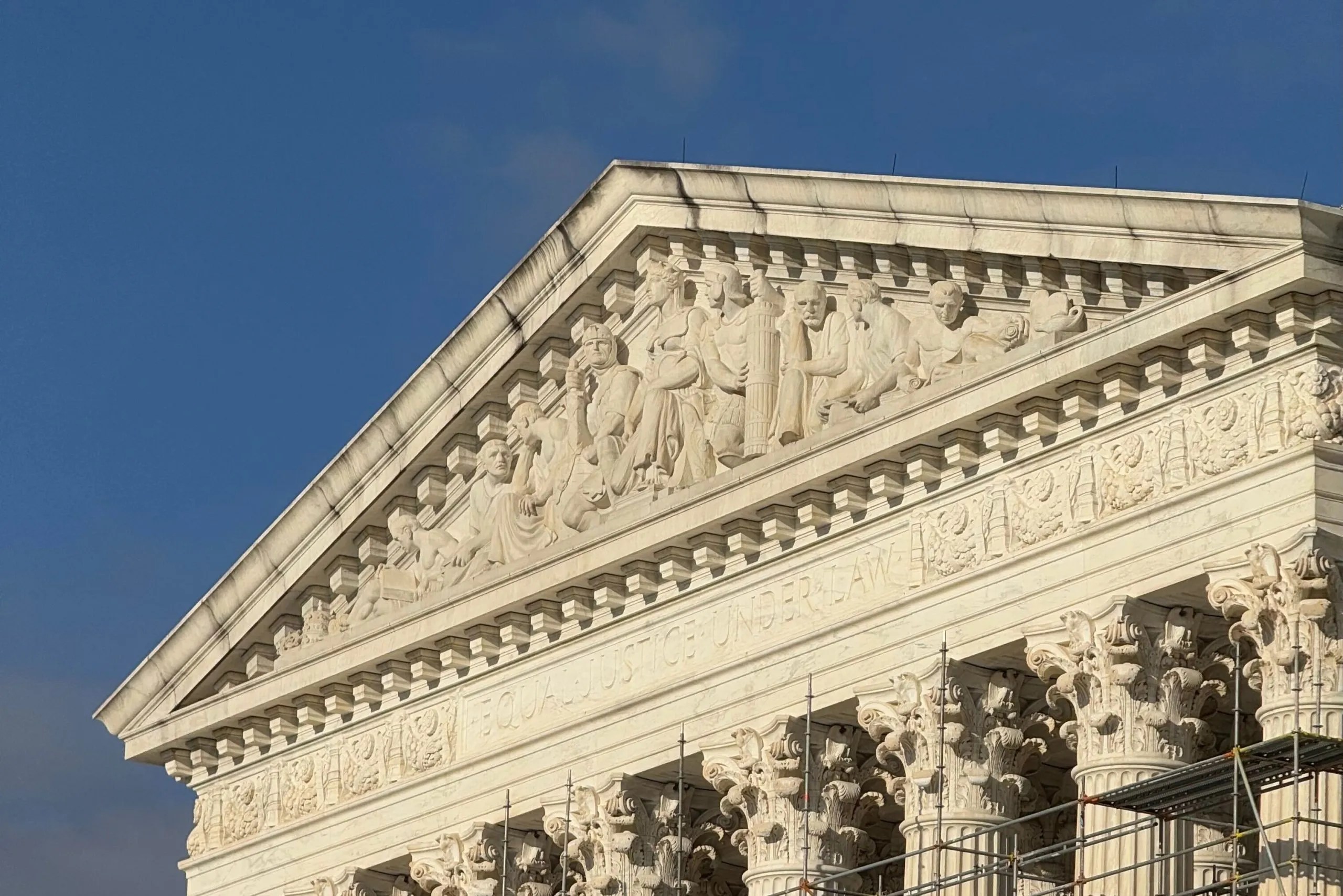SCOTUStoday for Wednesday, October 29


We’re one week away from oral arguments on President Donald Trump’s tariffs, and SCOTUSblog and the Advisory Opinions podcast have some big plans for this. SCOTUSblog will be hosting a live blog during the argument on Wednesday, Nov. 5, and Amy will join a live Advisory Opinions broadcast once the arguments conclude.
SCOTUS Quick Hits
- The Trump administration’s request to be allowed to federalize and deploy the National Guard in Illinois and attempt to change the current rules for sex markers on passports still await a ruling on the interim docket. Both cases have been fully briefed for at least a week.
- We’re less than one week away from the start of the court’s November sitting. We’ll be publishing previews of the cases scheduled to be argued throughout this week.
- Former Justice Anthony Kennedy is scheduled to speak about his new memoir at Stanford Law School tomorrow. The event is in-person only, but walk-ins are welcome, according to the event announcement.
Morning Reads
- Red states are preparing for an end to the Voting Rights Act (Andrew Howard, Politico) — As we noted in Monday’s edition of SCOTUStoday, the Louisiana Senate has voted to push back the state’s 2026 election dates in order to leave itself more time to potentially redraw its congressional map after the court rules in Louisiana v. Callais. Other states, including Florida and South Carolina, are also considering adopting a new map before next year’s elections if the Supreme Court offers new guidance on race-based redistricting, according to Politico. “The potential scramble to redraw could completely reshape the midterms,” but it’s not clear if the ruling will come in time to make such changes possible. “If a ruling drags into the summer, when some of the highest-profile cases are often decided, it could foreclose many states from redrawing lines.”
- Trump Argues in Formal Appeal That His Conviction Was ‘Fatally Marred’ (Jonah E. Bromwich, The New York Times)(Paywall) — President Donald Trump has formally appealed his criminal conviction from last year, when “a jury found him guilty of approving a scheme to falsify business records to conceal a hush-money payment made on his behalf during the 2016 election,” according to The New York Times. Among other arguments made in the appeal to the First Department of the New York Supreme Court’s Appellate Division, Trump contends that “the trial judge, Juan M. Merchan, improperly allowed the jurors to consider official presidential acts, for which the Supreme Court — several months after the trial — declared the president could not be prosecuted.”
- Trump National Guard case at Supreme Court is a fight over basic facts (Andrew Chung, Reuters) — Attorneys for the Trump administration and for Illinois and Chicago have offered very different accounts of what’s happening on the ground in Chicago in their Supreme Court filings on whether the justices should allow Trump’s planned National Guard deployment in the city to proceed, according to Reuters. “University of Chicago constitutional law professor Aziz Huq said it is not surprising for the court to be encountering a major gap between versions of events given its increasing willingness to settle weighty matters on its so-called emergency docket – as in this case – before the facts of a dispute have been fully determined.”
- Jan. 6 defendant pursues legal battle over police brutality (Alex Swoyer and Stephen Dinan, The Washington Times) — One year after the court ruled in his favor “when the justices nullified a key criminal charge brought by the Biden Justice Department against defendants in its prosecution of the Jan. 6, 2021, riot at the U.S. Capitol,” Jake Lang is at the center of another potential Supreme Court case, according to The Washington Times. Lang has asked the court to review his case alleging police brutality during the Jan. 6 protests. “A U.S. district judge dismissed his case, saying he didn’t comply with procedural rules and missed the deadline for correcting his errors. But Mr. Lang says he deserves consideration because he has a good reason for missing the deadline: He was in solitary confinement while awaiting trial” on charges related to his activities at the Capitol.
- Katyal to Argue Supreme Court Trump Tariff Case After Coin Toss (Justin Wise, Bloomberg Law) — Neal Katyal, a “prominent litigator” and former acting solicitor general who “has argued more than 50 cases at the Supreme Court,” will argue there again next week on behalf of small businesses that challenged Trump’s authority to impose tariffs under the International Emergency Economic Powers Act, according to Bloomberg Law. Rick Woldenberg, the CEO of Learning Resources Inc., one of the businesses involved in the case, said that Katyal won the job through “a coin flip” over Pratik Shah, the head of Akin Gump’s Supreme Court practice. “We are honored to be represented by Neal at this important moment in the case,” he said, “and are putting all our energy into preparing for the hearing in Nov. 5th.”
A Closer Look: Upcoming Petitions for Review
The justices’ next private conference, where they will consider petitions for review, is on Friday, Nov. 7. In preparation, we’ve added several new cases to our petitions page, which highlights notable disputes that have been appealed to the Supreme Court.
Here’s a closer look at three pending petitions.
Same-sex marriage
Davis v. Ermold is one of the most-discussed petitions of the 2025-26 term so far. Filed by Kim Davis, a former county clerk in Kentucky who in 2015 refused on religious grounds to issue a marriage license to a gay couple, the petition asks the court to overturn its decision recognizing a constitutional right to same-sex marriage. Davis contends that the decision “had no basis in the Constitution” and left her “with a choice between her religious beliefs and her job,” as Amy Howe previously reported.
This petition is scheduled to be considered for the first time at the Nov. 7 conference.
Asylum applications
In Noem v. Al Otro Lado, the Trump administration is asking the justices to determine at what point someone seeking protection from violence or discrimination in their home country “arrives in the United States” and is thus entitled to the opportunity to meet with an immigration officer and formally apply for asylum under the Immigration and Nationality Act.
Multiple administrations have interpreted that phrase to mean that someone is physically in the United States, which is why they’ve addressed border surges by capping the number of asylum seekers who can enter the country. But the U.S. Court of Appeals for the 9th Circuit held that asylum seekers arrive for the purposes of the Immigration and Nationality Act when they present themselves “to an official at the border,” even if that meeting takes place in Mexico.
This petition is scheduled to be considered for the first time at the Nov. 7 conference.
Religion and COVID-19 vaccination
In Does 1-2 v. Hochul, the court has been asked to return to a question that popped up across the country during the COVID-19 pandemic: What, if anything, do employers owe to workers who were fired because of religious objections to the COVID-19 vaccines?
The dispute centers on a New York state mandate that required employees at hospitals and nursing homes to be vaccinated against COVID-19 if, once infected, they could expose patients, residents, or other employees to the virus. The mandate has since been repealed, but a group of unnamed workers who lost their jobs when they refused, for religious reasons, to be vaccinated, are seeking money damages from their former employers. They contend that the employers violated a federal law on religious accommodations in the workplace. This petition originally was considered during the Sept. 29 conference, and it was then relisted for the two conferences in October. The justices are expected to consider it again on Nov. 7.
SCOTUS Quote
“Nothing can destroy a government more quickly than its failure to observe its own laws, or worse, its disregard of the charter of its own existence.”
— Justice Tom Clark in Mapp v. Ohio
On Site
From Kelsey Dallas
The President’s Power to Deploy Troops Domestically
Since June, President Donald Trump has ordered several National Guard deployments within the United States, often against the wishes of the Democratic governors of the states where troops are being sent. The resulting legal battles have put a spotlight on the president’s authority to federalize troops and use them domestically. How far, exactly, does this power extend? Kelsey analyzed the legal backing behind Trump’s recent deployment orders.
Posted in Featured, Newsletters